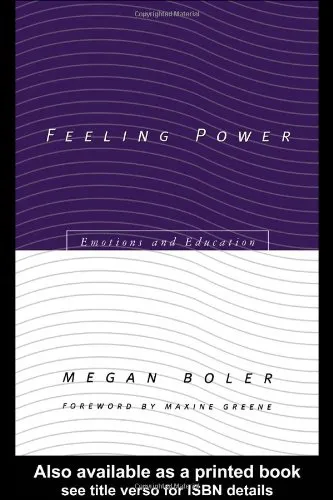Feeling Power: Emotions and Education
4.3
بر اساس نظر کاربران

شما میتونید سوالاتتون در باره کتاب رو از هوش مصنوعیش بعد از ورود بپرسید
هر دانلود یا پرسش از هوش مصنوعی 2 امتیاز لازم دارد، برای بدست آوردن امتیاز رایگان، به صفحه ی راهنمای امتیازات سر بزنید و یک سری کار ارزشمند انجام بدینکتاب های مرتبط:
مقدمه کتاب «Feeling Power: Emotions and Education»
کتاب «Feeling Power: Emotions and Education»، نوشته مگان بولر، یکی از آثار تأثیرگذار در حوزه آموزش و بهبود درک احساسات در فرآیند یادگیری است. این کتاب به شکلی عمیق و منتقدانه، نگاه مخاطبان را به سمت جنبههای نادیدهگیریشده آموزشی معطوف میکند و نقشی را که احساسات در بحثهای قدرت، دانش و آموزش ایفا میکنند، برجسته میسازد. مگان بولر در این کتاب نهتنها به نظریههای آموزش سنتی میپردازد، بلکه مفاهیم جدیدی مانند ethical anger، power dynamics و pedagogies of discomfort را نیز معرفی میکند. او تلاش میکند خوانندگان خود را ترغیب کند که نگاهی دوباره به تعاملات میان احساسات و قدرت داشته باشند، و روشن سازد که چگونه این عوامل میتوانند یادگیری و آموزش را متحول سازند.
خلاصهای جامع از کتاب
در اثر تحلیلی و شگرف «Feeling Power»، مگان بولر عمق رابطه میان قدرت، احساسات و فرآیند یادگیری را به نمایش میگذارد. او به بررسی تاریخی و فرهنگی نقش احساسات در محیطهای آموزشی میپردازد و نشان میدهد که چگونه این نقشها میتوانند در خدمت حفظ و یا به چالش کشیدن هژمونیهای مختلف باشند. بولر، از طریق مفاهیمی مانند pedagogies of discomfort، از معلمان و مدرسین میخواهد که احساسات دانشآموزان و حتی خودشان را بهعنوان منابع ارزشمند یادگیری تلقی کنند.
یکی از موضوعات کلیدی دیگر کتاب، معرفی و تجزیه و تحلیل اصطلاحاتی مانند ethical anger و emotional labor است. بولر توضیح میدهد که چگونه خشم انسانی، زمانی که بهدرستی مدیریت شود، میتواند تبدیل به ابزاری اخلاقی شود که برای تغییر اجتماعی و یادگیری عمیقتر به کار رود. همچنین، او موضوع بار عاطفیای که برخی گروهها، بهویژه اقلیتها و زنان، در محیطهای آموزشی تحمل میکنند، را بررسی کرده و نقش قدرت در تحمیل این بارها را نقد میکند.
این کتاب با ارائه نمونههایی ملموس از تاریخ و آموزش معاصر، مسائلی چون نقش سیاست، فرهنگ و ایدئولوژی در چارچوب احساسات را مورد بررسی قرار میدهد.
نکات کلیدی
- تأکید بر نقش احساسات در یادگیری و آموزش، نهفقط بهعنوان مسئلهای فردی، بلکه بهعنوان یک پدیده اجتماعی و سیاسی.
- توضیح مفهوم pedagogies of discomfort و اهمیت استفاده از آن برای چالش دادن مفروضات دانشآموزان.
- تحلیل ethical anger بهعنوان راهی برای ایجاد تغییرات اجتماعی مثبت.
- بررسی نقش قدرت و سیاست در فرآیندهای عاطفی که در محیطهای آموزشی رخ میدهد.
جملات معروف از کتاب
«The act of teaching and learning demands much more than the transfer of information; it requires an acknowledgment of the emotional landscapes we navigate daily.»
«Discomfort is not something to avoid but rather a vital space for growth and transformative education.»
چرا این کتاب اهمیت دارد؟
کتاب «Feeling Power: Emotions and Education» دریچهای جدید به تأثیرات احساسات در آموزش باز میکند. برخلاف رویکردهای معمول که فقط بر دانش عقلانی تأکید میکنند، بولر اهمیت احساسات بهعنوان بخشی جداییناپذیر از تجربه یادگیری را به وضوح نشان میدهد. این کتاب بهویژه برای معلمان، مدرسین دانشگاهها، مربیان و پژوهشگران آموزشی که به دنبال شیوههای نوین و اخلاقی تدریس هستند، بسیار ارزشمند است. همچنین، بولر به خوانندگان کمک میکند بفهمند که چگونه احساسات، در بطن قدرتها و سیاستهای اجتماعی، میتوانند ابزاری برای تحول آموزشی باشند.
این اثر فقط یک بررسی نظری نیست، بلکه نقشه راهی عملی برای چالش دادن روشهای سنتی آموزش و درک عمیقتر از مفاهیم قدرت، احساسات، و ارتباط آنها با فرآیند یادگیری است.
Introduction to Feeling Power: Emotions and Education
Feeling Power: Emotions and Education explores the complex intersections of emotions, power, and pedagogy, offering a transformative critique of how emotions are relegated to the margins in educational settings. Written by Megan Boler, the book questions the historical and institutional practices in education that often devalue emotional responses in favor of rational, detached learning processes. Boler challenges readers to recognize how emotions are intricately tied to power structures, influencing not only how individuals learn but also how societal hierarchies are maintained or contested.
This groundbreaking work reimagines the role emotions play in education, examining their integration within practices of critical pedagogy, identity politics, and cultural studies. Boler's work resonates particularly in contemporary classrooms, where issues of equity, inclusion, and representation are at the forefront. At its core, Feeling Power argues that emotions should be acknowledged not as disruptive forces but as central to understanding social dynamics and galvanizing transformative learning experiences.
Detailed Summary of the Book
Feeling Power: Emotions and Education is both a critique and an invitation. It scrutinizes how educational institutions have historically treated emotions as secondary considerations in learning, often reducing them to private, individual experiences that do not belong in "rational" discourse. Drawing from diverse disciplines—including philosophy, feminist theory, cultural studies, and critical pedagogy—Boler situates emotions as deeply political and integral to processes of learning and unlearning.
Divided into chapters that reflect a theoretical and practical interrogation of the topic, the book discusses how emotions such as anger, fear, and empathy are regulated in classrooms, often reinforcing societal inequalities. Boler takes a keen interest in feminist theorists like bell hooks and Audre Lorde, who have long argued for the importance of emotional intelligence as a tool for resistance and change. She also investigates the ways in which emotions are co-opted to sustain oppressive ideologies, all while inviting educators to critically reframe their pedagogical approaches.
By embedding emotional literacy into teaching practices, Boler proposes a vision for education that is not only intellectually stimulating but also deeply connected to issues of justice, equity, and human experience. This makes the book an essential resource for educators, scholars, and activists committed to meaningful, transformative education.
Key Takeaways
- Emotions are not merely individual responses but are shaped by societal norms and power dynamics.
- Detaching emotions from education perpetuates inequalities and power imbalances in society.
- Empathy and emotional literacy are central tools for fostering critical thinking and social change.
- Educators must critically examine their own emotional investments and biases to create inclusive, transformative learning environments.
- Challenging dominant ideologies requires the integration of emotions into pedagogical practices.
Famous Quotes from the Book
"To understand emotions is to situate them within the dynamics of power, privilege, and oppression."
"Feeling power is about recognizing the political weight of our emotions and their capacity to challenge injustice."
"Education is not merely about the mind; it is equally about the heart and the courage to confront discomfort."
Why This Book Matters
Feeling Power: Emotions and Education takes an ambitious and urgent approach to an often-overlooked yet crucial area in education—emotions. While schools and universities frequently emphasize cognitive skills, Boler argues that ignoring the emotional dimensions of learning fosters a superficial understanding of critical societal issues.
This book resonates particularly strongly in an era marked by heightened emotional and political divides, where difficult discussions about race, gender, and privilege demand both rational and emotional engagement. For educators striving to build inclusive classrooms and challenge systemic inequities, Boler’s insights are invaluable.
Ultimately, Feeling Power provides not only theoretical insights but also practical tools for integrating emotional awareness into everyday education. It empowers readers to rethink traditional notions of learning as detached from emotional experiences, instead embracing emotions as vital agents for creativity, empathy, and social transformation.
دانلود رایگان مستقیم
You Can Download this book after Login
دسترسی به کتابها از طریق پلتفرمهای قانونی و کتابخانههای عمومی نه تنها از حقوق نویسندگان و ناشران حمایت میکند، بلکه به پایداری فرهنگ کتابخوانی نیز کمک میرساند. پیش از دانلود، لحظهای به بررسی این گزینهها فکر کنید.
این کتاب رو در پلتفرم های دیگه ببینید
WorldCat به شما کمک میکنه تا کتاب ها رو در کتابخانه های سراسر دنیا پیدا کنید
امتیازها، نظرات تخصصی و صحبت ها درباره کتاب را در Goodreads ببینید
کتابهای کمیاب یا دست دوم را در AbeBooks پیدا کنید و بخرید
1411
بازدید4.3
امتیاز50
نظر98%
رضایتنظرات:
4.3
بر اساس 0 نظر کاربران
"کیفیت چاپ عالی بود، خیلی راضیام"



